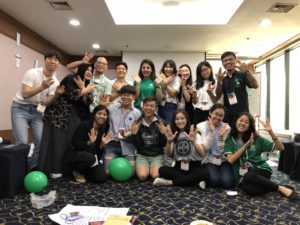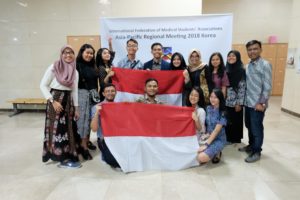
By Kadek Dhanya – CIMSA UNAIR
Intense 3 days of gaining new knowledge, honing new skills, meeting fellow human rights and peace student enthusiast and sharing the projects, activities, ideas and dream. Asia Pacific Regional Meeting was surely a memorable experience that I had always dreamed of. Briefly, it can be divided into training for new trainers, advocacy and policy making, and surely the SCO sessions! A regional networking is what we are aiming for and sessions are the integral part of it.
As a human rights enthusiast and part of SCORP, I joined the SCORP session and much I can say it was fascinating. What shapes SCORP as it is today is its mission to create an international agent of change. There is lot sceptics of what we, mere medical students, can do to shapes the world peace, but I do believe even the smallest act when brought together, it will surely leave an impact.
The sessions consisted on several topics, such as: Human Rights 101, Ethical training with mental health compartment, international humanitarian law and physiological first aids, health inequality, gender base violence, and universal basic income.
Let’s look briefly on some of these topics.
Human rights 101
This is why SCORP exist.
I’ll say that simple statement is so powerful that in every SCORP meetings, it is fundamental to remind us again, of why are we here? To which and one of us, we gained freedoms that are guaranteed by signed document called Universal Declaration of Human Rights in December 10, 1948. This declaration sets an ideal example for the human rights movement across the globe. In the modern world, we adopt the concept of individualism which every person has their own free thinking. After the UDHR, most of the global declaration focuses on (relatively small) community based human rights such as Universal Declaration on the Rights of Indigenous Peoples and UN declaration on sexual orientation and gender identity. This means, that people are being more conscious about their rights and fight for it until a declaration released which sets their place in this earth. We, SCORPions, are lucky that we live in a world where people come together to advance the ideals and gain a mutual respect.
International Humanitarian Law and Physiological First Aid
Physical injury is only temporary, but mental wounds stays forever.
Based on International Committee of Red Cross, International humanitarian law is a set of rules which limits the effect of international armed conflict. It protects person who are not or are no longer participating in the hostilities and restricts the means and methods of warfare. It protects civilians, medical personnel, religious personnel and wounded or sick military personnel. In the past, history has written many discriminations on less fortunate state and caused unnecessary suffering as effect of warfare.
As humans, we encounter many distressing events in our everyday life. People cope differently. In an emergency and distressing event, as many as 57 % people suffers from psychological issues. Psychological First Aid provides a protection, and extra support, for them who are suffering, confused and very much vulnerable. PFA provides a guidance for every person, not only professionals health care provider, to take a responsibility which shapes a person’s future. There are 3 main principles: safety, dignity and rights. Safety as in avoid any harm that may cause further wounds, dignity as in treat people with respect based on their cultural and social norms, and rights as in making sure these people can access help without any discrimination. Using these principles, any capable person can help people feel reassured and calm, preventing them to collapse and suffering from PTSD. This of course is a very brief explanation and we do hope everyone to read WHO PFA Guide for field worker.
Gender Base Violence
An issue that is much talked on but less acted upon.
GBV can be in numerous forms, whether its physical, emotional, psychological or sexual acts which are against a person’s will and is based on gender norms. Sometimes, it is mistaken as a violence exclusively for girls, but violence in boys happens too. To eradicate gender base violence means to reform social norms & traditional belief. In our discussion, we agree that one of the most effective ways are marriage planning & access to justice. Family is a source of violence, whether we admit it or not. By pre-marriage planning, couples can create a positive environment and learning conflict resolution skills. Ideally, this counseling is provided in local community health center. Creating a healthy marriage is an investment of future community with healthy-relationship, eventually traditional belief which suppress equality will subside. It is, indeed, a long shot. If violence already occurs, providing a safety plan can avoid dangerous situations. Safety plan means an access to justice. Numerous laws are made to condemn any gender base violence, but the access and implementation doesn’t meet the ideal state. By having a marriage counselor in local health center, victims will have a “safe place” to seek justice in a GBV.
Being a student is a privilege. It gained us a role as youth spokesperson, whose ideas are heard and considered by governmental and non-governmental organization. It gained us access to organize a discussion such as the SCORP session. One important lesson that I brought home is no matter how developed the country is, human rights is always at risk of being violated. In Asia-Pacific, every country are facing different kinds of human rights violation. Every one of us is concerned and eager to make a difference. Every SCORPions in Asia-Pacific region has their own way to solve those problems. Some managed to even break into the government policy about disabilities access in public places and create a wave of change in their locals. Some managed to convinced schools to provide a sex & gender education by giving free lectures and workshops in primary school. This is SCORP making words into reality, this is SCORP that implements their vision and mission.
The question remains, after series of discussion and meetings, how will we implement this in our locals? How will we make words into reality? The message is simple: Believe that young minds are capable and very eager to make an impact for the world health progress.



